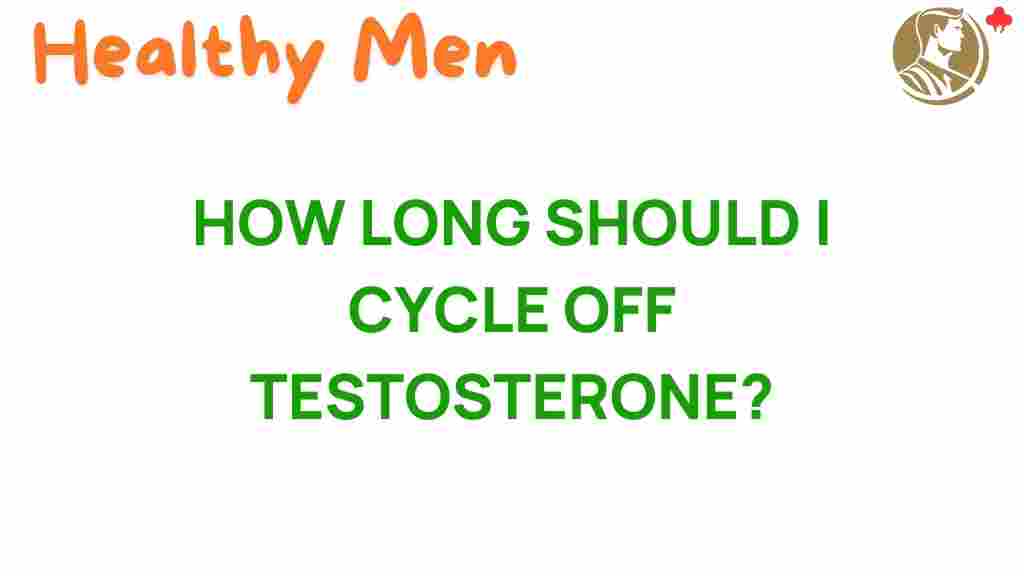The Essential Guide to Cycling Off Testosterone: What You Need to Know
When it comes to achieving optimal health and fitness, understanding testosterone cycling is crucial, especially for men. Testosterone plays a significant role in muscle gain, energy levels, and overall men’s health. However, cycling off testosterone can be a challenging process that requires careful planning and knowledge of hormone therapy. In this guide, we will provide you with essential health tips, fitness advice, and insights into maintaining hormonal balance while cycling off testosterone.
Understanding Testosterone Cycling
Testosterone cycling refers to the method of using testosterone supplements or therapies in a structured manner, followed by a period of cessation. This approach is often adopted by athletes and bodybuilders to maximize muscle gain while minimizing side effects. When cycling off testosterone, it is essential to consider the following:
- Recovery Period: Allowing your body a proper recovery period is vital for restoring natural testosterone levels.
- Hormonal Balance: Maintaining hormonal balance is crucial to avoid negative side effects.
- Health Monitoring: Regular health check-ups are important during this period.
Why Consider Cycling Off Testosterone?
Cycling off testosterone can be beneficial for several reasons:
- Preventing Dependence: Avoiding long-term reliance on testosterone can help maintain natural hormone production.
- Minimizing Side Effects: Prolonged use of testosterone can lead to various side effects, including mood swings, acne, and liver issues.
- Improving Hormonal Health: Cycling allows the body to recalibrate its hormonal balance, which is essential for overall health.
Steps to Successfully Cycle Off Testosterone
Here are the steps you should follow to effectively cycle off testosterone:
1. Consult a Healthcare Professional
Before making any changes to your testosterone regimen, consult with a healthcare professional. They can provide personalized advice based on your health history and current situation.
2. Gradual Reduction
Instead of stopping testosterone abruptly, consider tapering down the dosage. This gradual reduction helps your body adjust without shock. Here’s how:
- Reduce your dosage by 25% every few weeks.
- Monitor your body’s response during this period.
3. Implement Post-Cycle Therapy (PCT)
Post-cycle therapy is crucial for restoring hormonal balance. It typically involves the use of medications that stimulate natural testosterone production. Common options include:
- Clomiphene Citrate: Helps stimulate the pituitary gland to produce more testosterone.
- Human Chorionic Gonadotropin (HCG): Aids in maintaining testicular function during the recovery phase.
4. Focus on Nutrition
Your diet plays a significant role in your recovery. Focus on nutrient-dense foods that promote hormonal health:
- Lean proteins (chicken, fish, legumes)
- Healthy fats (avocado, olive oil, nuts)
- Fruits and vegetables rich in vitamins and minerals
5. Stay Active
Continuing with a fitness routine is essential during the recovery period. However, adjust your workout intensity:
- Incorporate strength training but allow for adequate rest.
- Include cardiovascular activities to maintain overall fitness.
6. Monitor Your Symptoms
Keep track of any symptoms you experience during your cycle off testosterone. Common side effects may include:
- Fatigue
- Reduced libido
- Mood swings
If symptoms become severe, consult your healthcare provider immediately.
Common Side Effects of Cycling Off Testosterone
Cycling off testosterone can lead to various side effects, some of which may be uncomfortable. Understanding these side effects can help you prepare and manage them effectively:
- Fatigue: A common side effect as your body adjusts to lower testosterone levels.
- Depression and Mood Changes: Hormonal fluctuations can impact mood significantly.
- Loss of Muscle Mass: You may notice a decrease in muscle size and strength.
- Changes in Libido: Reduced interest in sexual activity is common during this adjustment phase.
Health Tips During the Transition
To ease the transition while cycling off testosterone, consider these health tips:
- Hydrate: Drink plenty of water to stay hydrated and support metabolic processes.
- Sleep Well: Aim for 7-9 hours of quality sleep per night to aid recovery.
- Manage Stress: Practice stress-reduction techniques such as meditation or yoga.
- Stay Informed: Read up on men’s health topics to understand how best to support your body.
Fitness Advice During Recovery
Maintaining a fitness routine during your recovery period is essential. Here’s some advice to keep you on track:
- Adjust Your Workouts: Reduce the intensity and volume of your workouts if you feel fatigued.
- Focus on Compound Movements: Exercises like squats and deadlifts can maximize muscle engagement.
- Incorporate Flexibility Training: Yoga or stretching can enhance recovery and prevent injuries.
Troubleshooting Common Issues
During your testosterone cycling journey, you may encounter several issues. Here’s how to troubleshoot:
1. Persistent Fatigue
If fatigue is overwhelming, consider adjusting your diet and sleep schedule. Consult with a healthcare provider if it continues.
2. Mood Swings
Practice relaxation techniques and engage in activities that bring you joy. If mood swings become severe, medical intervention may be necessary.
3. Muscle Loss
Ensure you are consuming enough protein and maintaining a regular workout routine to minimize muscle loss.
Conclusion
Cycling off testosterone is a significant decision that requires careful planning and execution. By understanding the principles of testosterone cycling, implementing post-cycle therapy, and focusing on recovery through nutrition and fitness, you can navigate this period successfully. Remember to monitor your health and consult with professionals as needed. With the right approach, you can maintain hormonal balance, mitigate side effects, and continue to support your overall men’s health.
For more information on men’s health and hormone therapy, check out this helpful resource. Additionally, consider visiting this article for more fitness advice tailored to your needs.
This article is in the category Conditions and created by healthymen Team
